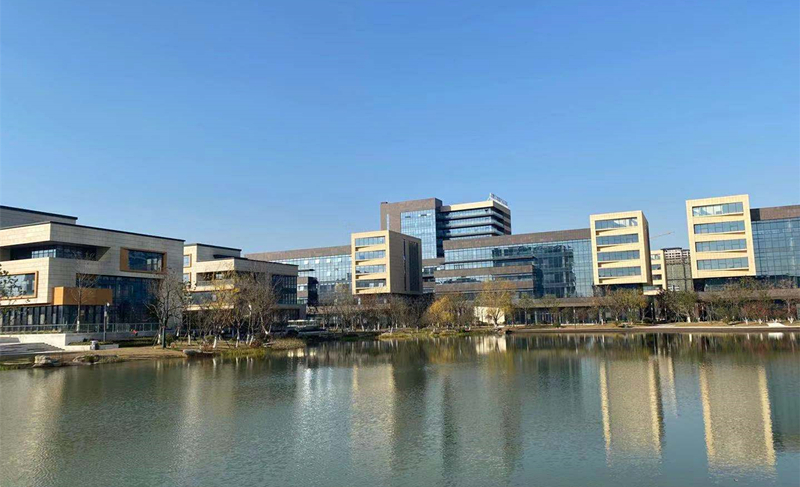Hefei strives to support innovations
- By Zhang Rui
 0 Comment(s)
0 Comment(s) Print
Print E-mail China.org.cn, December 16, 2020
E-mail China.org.cn, December 16, 2020
Local officials and enterprise representatives in Hefei shared their views on Tuesday about industrialization and commercialization of innovations, which has been high on the development agenda of the capital city of Anhui province.

Wu Zhongcheng, president and general manager of CAS (Hefei) Institute of Technology Innovation Co., Ltd., emphasized the importance of accelerating the commercialization of scientific and technological achievements, noting that it is still difficult for such achievements by scientists and institutions to successfully enter the market.
"It is difficult for China, and also for the world. We have made several explorations to quicken the process," Wu said. His company set up relevant funds financed by venture capital for possible commercialization of its achievements, and to meet funding demands for enterprises to manufacture.
He said their work centers around deploying their innovation achievements throughout the industry chain. "We focus on the three major areas of future industry -- digital economy, life science, and new materials - to build relevant R&D public service platforms. At the same time, by introducing professional teams, we seek to build a system of 'platform +teams +services,' and establish venture capital funds for industrialization of science and technology."
Macro Silicon, located at the Hefei National High-tech Industry Development Zone, is a model company for intellectual property protection and management in Hefei and awarded for this by the local government in 2015.
Currently, the company has more than 400 registered intellectual property rights and 17 patents for their semiconductor products, chips and integrated circuits.
Chen Shanshan, director of the planning and development center of Macro Silicon, told China.org.cn that the company pays great attention to self-developed technologies, and her company and the entire industry got a lot of attention, investment and government support.
"When we started our business in 2009, from company registration to loan support, the Hefei High-tech Zone gave us a lot of help," Chen recalled. "We still remember that our first loan was the innovation loan of the high-tech zone, which was 350,000 yuan. Although it's not a big amount, the support and encouragement given to us is very large and inspiring."
Afterwards, the company's formal mass production and industrialization have enjoyed the support of corresponding special policies introduced by the high-tech zone. In the past decade, in order to support technological innovation, Hefei has gradually improved the policy system and business environment, and has provided high-tech enterprises with assistance such as technology insurance, angel investment, and the introduction of high-level foreign talents.
Since China's reform and opening up in the late 1970s, Hefei has been firmly taking innovation as the primary driving force for development, and has continued to improve scientific and technological innovation capabilities. As the pace of technological innovations accelerates, a large number of original creative ideas and major scientific and technological achievements have come from Hefei, ranging from China's first microcomputer, the world's first Video CD player, to the quantum science satellite "Mozi," dark matter particle explorer satellite "Wukong" and the quantum computer prototype "Jiuzhang".
The Hefei High-tech Zone, approved and established by the State Council, is one of the first national zones of its type. Now, it has more than 200,000 talents working in different areas, more than 3,000 of whom are foreign talents. Over 40,000 enterprises are located in the zone, among them 1,500 are national level high-tech companies. There are more than 200 various funds and venture capital initiatives with a total scale of 220 billion yuan set up to help innovations and entrepreneurship.
According to Xu Zhaohui, director of the Science and Technology Bureau of Hefei High-tech Zone, in the face of the complex international situation and the COVID-19 pandemic, the high-tech zone has seized and created opportunities out of crisis and difficulties. Compared with the same period last year, the number of new enterprises located in the zone has exceeded 10,000, and the number of new high-tech enterprises has exceeded 300.
"In the next three to five years, the zone will strive to build a world-class business environment, a source land of original innovations, and high-quality industrial systems. We will work to achieve greater breakthroughs in high-quality development, accelerate technological and financial innovation, stimulate the vitality of innovation and entrepreneurial talents, as well as enhance innovative management systems and mechanisms.
Yan Ping, deputy secretary-general of the Hefei Municipal People's Government, added that, this year, Hefei has established a key industry chain-leader system, focusing on 12 key industries, which means that relevant responsible officials of the Communist Party of China (CPC) municipal committee and the municipal government serve as industry chain leaders to take care of their needs respectively.
In this move, Hefei hopes to clarify the specific needs of the development of each industrial chain and optimize industrial policies and measures.
"The innovation sector is like the gene and cell of a city. It is distributed in various places of the city." Yan said.






Go to Forum >>0 Comment(s)